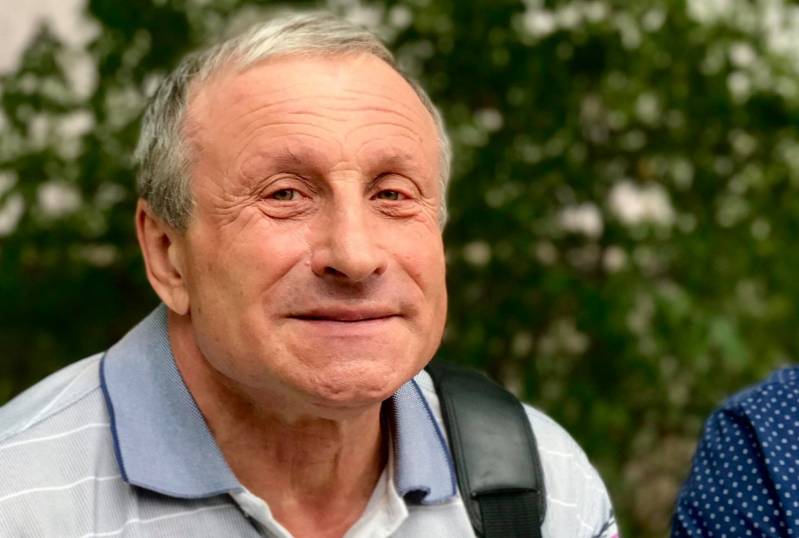No end to brutal torment of Ukrainian journalist sentenced for opposing Russian occupation of Crimea

Mykola Semena is facing a long period of recuperation after an operation in occupied Crimea for a condition likely brought on by the stress of the political persecution the Ukrainian journalist has suffered since 2016. Although Russia stopped short of actually imprisoning the 68-year-old journalist for expressing his opposition to Russian occupation in an article, the two-and-a-half year suspended sentence imposed still means that he is effectively imprisoned in Crimea and prevented from receiving urgently needed specialist medical treatment for heart problems and complications after a spinal injury in Kyiv.
On top of the other serious health concerns, Semena has developed cholecystitis, or inflammation of the gall bladder. According to journalist Anton Naumlyuk, the operation on 12 November was to remove both the gall bladder and gallstones, and since he was only discharged on 21 November, the operation must have been quite serious. Semena’s lawyer, Emil Kurbedinov is in no doubt that the new problems arose “as a result of the nearly three years of illegal persecution through the courts”.
In September this year, appeals were made from the Ukrainian Human Rights Ombudsperson, Ukraine’s Union of Journalists, as well as international NGOs, for Semena to be allowed to travel to Kyiv. All of them were rejected.
Semena’s difficulties in Crimea are further exacerbated by the fact that he has been banned from working as a journalist. Long before the sentence, he was also placed on Russia’s notorious ’List of Terrorists and Extremists’, with this placing restrictions even on his use of a bank.
The particularly shocking part about Russia’s prosecution and ongoing persecution of Semena is that the pretext chosen was an op-ed article in which the journalist expressed exactly the same position as that taken by the UN General Assembly, EU, OSCE, and all democratic countries regarding Russia’s occupation of Crimea.
Russia claimed that Semena’s article had contained ‘public calls to action aimed at violating Russia’s territorial integrity’. In fact, as Semena and his lawyers stressed, the journalist had been protecting Russia’s territorial integrity since Russia recognizes Crimea as Ukrainian in numerous international treaties from which it has not withdrawn.
The article in question was entiled: “The Blockade – a necessary first step to the liberation of Crimea” and had been written in September 2015, and posted on Krym.Realii, as a response to the concerns expressed in a first op-ed about hardships that the civic blockade, initiated with detailed human rights demands, could cause.
“The Blockade must be full, systematic and designed so that it is followed by liberation”, Semena wrote. “Yes, Ukraine will never bring war to Crimea, that’s true. Because it [war] was brought there by Russia. The fact that in Crimea there is no military action now, is to the credit of Ukraine, not of Russia. Ukraine handed Crimea over when it was not able defend it, but that doesn’t mean for ever.”
The indictment claimed that Semena had been “motivated by political animosity to the Russian Federation and the fact of the Crimean Republic having become a new subject of the RF, and aware of the criminal nature of his actions”.
This absurd claim and an evidently shoddy ‘expert assessment’ were accepted, first by ‘judge’ Nadezhda Igorevna Shkolnaya from the Zheleznodorozhny Court in Simferopol on 22 September, 2017, . She passed the 2.5 year suspended sentence with a probation period of three years and a ban on any public activities for the same period. Semena was also ordered to appear at the FSB twice a month.
This ‘ruling’ was upheld on 18 December 2017 by the de facto High Court under ‘judge’ Igor Kryuchkov though the latter reduced both the probation period and length of the ban on Semena engaging in any public activity from three to two years.
Russia’s persecution of Semena and its ongoing refusal to allow him to receive proper medical treatment were and remain aimed at demonstrating to other journalists and activists what they can expect if they don’t keep their heads low. In Semena’s case, there were also chilling echoes of the Soviet security police in the level of surveillance that he was under, with his computer being watched literally while he wrote the article in question.





